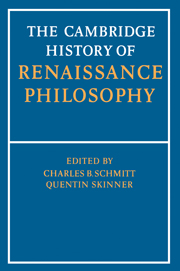Book contents
- Frontmatter
- Introduction
- PART 1 THE INTELLECTUAL CONTEXT
- PART 2 PHILOSOPHY AND ITS PARTS
- 6 Logic and language: Traditional logic
- 7 Logic and language: Humanistic logic
- 8 Natural philosophy: Traditional natural philosophy
- 9 Natural philosophy: The new Philosophy of nature
- 10 Natural philosophy: Astrology and magic
- 11 Moral philosophy
- 12 Political philosophy
- 13 Psychology: The concept of psychology
- 14 Psychology: The organic soul
- 15 Psychology: The intellective soul
- 16 Metaphysics
- 17 Problems of knowledge and action: Fate, fortune, providence and human freedom
- 18 Problems of knowledge and action: Theories of knowledge
- 19 Problems of knowledge and action: Epistemology of the sciences
- 20 Philosophy and humanistic disciplines: Rhetoric and poetics
- 21 Philosophy and humanistic disciplines: The theory of history
- PART 3 SUPPLEMENTARY MATERIAL
- Biobibliographies
- Bibliography
- Index nominun
- Index rerum
- References
12 - Political philosophy
from PART 2 - PHILOSOPHY AND ITS PARTS
Published online by Cambridge University Press: 28 March 2008
- Frontmatter
- Introduction
- PART 1 THE INTELLECTUAL CONTEXT
- PART 2 PHILOSOPHY AND ITS PARTS
- 6 Logic and language: Traditional logic
- 7 Logic and language: Humanistic logic
- 8 Natural philosophy: Traditional natural philosophy
- 9 Natural philosophy: The new Philosophy of nature
- 10 Natural philosophy: Astrology and magic
- 11 Moral philosophy
- 12 Political philosophy
- 13 Psychology: The concept of psychology
- 14 Psychology: The organic soul
- 15 Psychology: The intellective soul
- 16 Metaphysics
- 17 Problems of knowledge and action: Fate, fortune, providence and human freedom
- 18 Problems of knowledge and action: Theories of knowledge
- 19 Problems of knowledge and action: Epistemology of the sciences
- 20 Philosophy and humanistic disciplines: Rhetoric and poetics
- 21 Philosophy and humanistic disciplines: The theory of history
- PART 3 SUPPLEMENTARY MATERIAL
- Biobibliographies
- Bibliography
- Index nominun
- Index rerum
- References
Summary
THE MEDIEVAL INHERITANCE
‘It has been the achievement of the Italians’, wrote Poggio Bracciolini in his De nohilitate, ‘to spread to all other nations a proper understanding of humanitas, virtus and the whole art and science of living a communal life’. There is much truth in Poggio's seemingly extravagant boast. If we wish to understand the origins and development of Renaissance political thought, we must certainly focus our main attention on the city-states of the Regnum Italicum and the forms of political literature to which they gave rise.
The revival of Roman law
By the time Poggio was writing in the 1440s, the Italian city-states had already enjoyed a long and distinguished history. They first began to establish themselves as independent communes around the year 1100, and by the end of the twelfth century most of them had adopted an elective system of government centred on an official known as the podestà, so-called because he was invested with supreme power or potestas in the administration of the community's affairs. At the same time they began to evolve a new and distinctive form of political literature, a literature of advice-books devoted to explaining the duties of a podestà and how best to discharge them. The earliest known example is the anonymous Ocuius pastoralis of 1242, the doctrines of which were later expanded by Giovanni da Viterbo in his De regimine civitatum and Brunetto Latini in his Livres dou trésor, an encyclopaedic work of the 1260s which ends with a discussion of ‘The government of cities’.
- Type
- Chapter
- Information
- The Cambridge History of Renaissance Philosophy , pp. 387 - 452Publisher: Cambridge University PressPrint publication year: 1988
References
- 13
- Cited by

